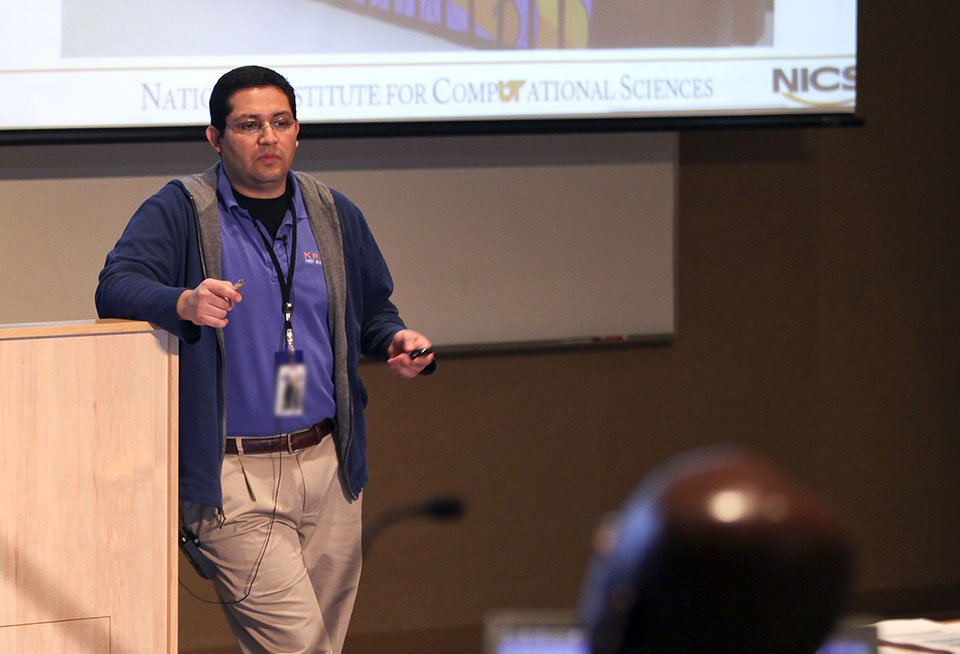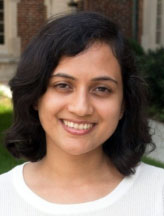Expert-led Workshops Meet Users Wherever They are in Computing

Daniel Lucio of the NICS User Assistance group provides instruction in high-performance computing.
Advanced computing, or high-performance computing (HPC), as it's also known, can be of benefit to research in virtually any science or engineering field, but sometimes, potential users haven’t been exposed to its practical aspects and capabilities.
“That’s where the National Institute for Computational Sciences [NICS], the computing center run by the Joint Institute for Computational Sciences [JICS], can have the greatest value-add to any program wanting to take their computing to the next level,” says Bobby Whitten, NICS’ User Assistance group leader.
Whitten’s group designs and tailors courses to introduce people who have not used advanced computing to the fundamental concepts applied at NICS and JICS every day.
Seeking to gear up the computational side of her research group, Assistant Professor Sharani Roy of the Department of Chemistry at the University of Tennessee, Knoxville, invited NICS to present a survey course June 15–Aug. 17 on “High-Performance Computing Fundamentals.”
The course focused on providing students with an introduction to the concepts, tools, and methods for using high-performance computers to solve scientific problems and delved into how to access advanced computing machines, as well as how to develop and execute applications for them.
Roy joined UT's chemistry department as an assistant professor last fall. She said that since she works in the area of theoretical and computational chemistry, HPC is an important component of her research.
"Instead of my teaching high-performance computing to my research group, I decided to organize a NICS workshop during the summer," Roy says. "First, there was no doubt in my mind that learning HPC from a team of NICS experts would be far better than learning it from me. Second, the workshop gave me the opportunity to share this rich experience with people outside my research group and even outside my department at an affordable cost."

Sharani Roy, assistant professor in the University of Tennessee, Knoxville, Department of Chemistry, views advanced computing as an important component of her research.
Roy says that when she advertised the workshop, she received e-mails from a number of interested students and researchers from chemistry as well as other departments, plus a few faculty members.
"In fact, I strongly believe that had I informed them of the workshop further in advance, more eager students would have been able to rearrange their schedules and attend it," she says. "The NICS workshop was highly effective at introducing several important aspects of high-performance computing to a broad audience. While it was not possible to go too deeply into any particular area, the instructors beautifully captured the essence of each topic, provided as much information about it as possible within the allotted time, and recommended excellent text and online references for us to study them in detail."
The NICS approach greatly benefited the audience, which was composed of people with different interests and backgrounds, and diverse levels of expertise in HPC, Roy adds.
"What struck me most was how patiently and sincerely the NICS instructors shared their vast knowledge and expertise with us," she says. "They addressed even the most basic questions with respect and enthusiasm and kindly sent their slides to us after their presentations. They also offered to tailor the course to the needs and interests of the students. I strongly recommend this workshop to people interested in learning the essentials of high-performance computing and hope to organize it again in the future."
UT departments or research groups interested in scheduling an advanced computing workshop should contact NICS User Assistance at help@nics.utk.edu or Bobby Whitten at rmwjr@utk.edu. NICS' instructors will travel to a group's location or arrange to present courses at NICS' facilities or via webinar.
Article posting date: 8 October 2015
About JICS: Established by the University of Tennessee and Oak Ridge National Laboratory, the Joint Institute for Computational Sciences (JICS) is a conduit for research collaborations and a provider of advanced computing resources. It also is an educator in cutting-edge computing focused on solving the most difficult problems in science and technology. JICS operates the National Institute for Computational Sciences (NICS), a leading academic supercomputing center and a major partner in the National Science Foundation's eXtreme Science and Engineering Discovery Environment (XSEDE).